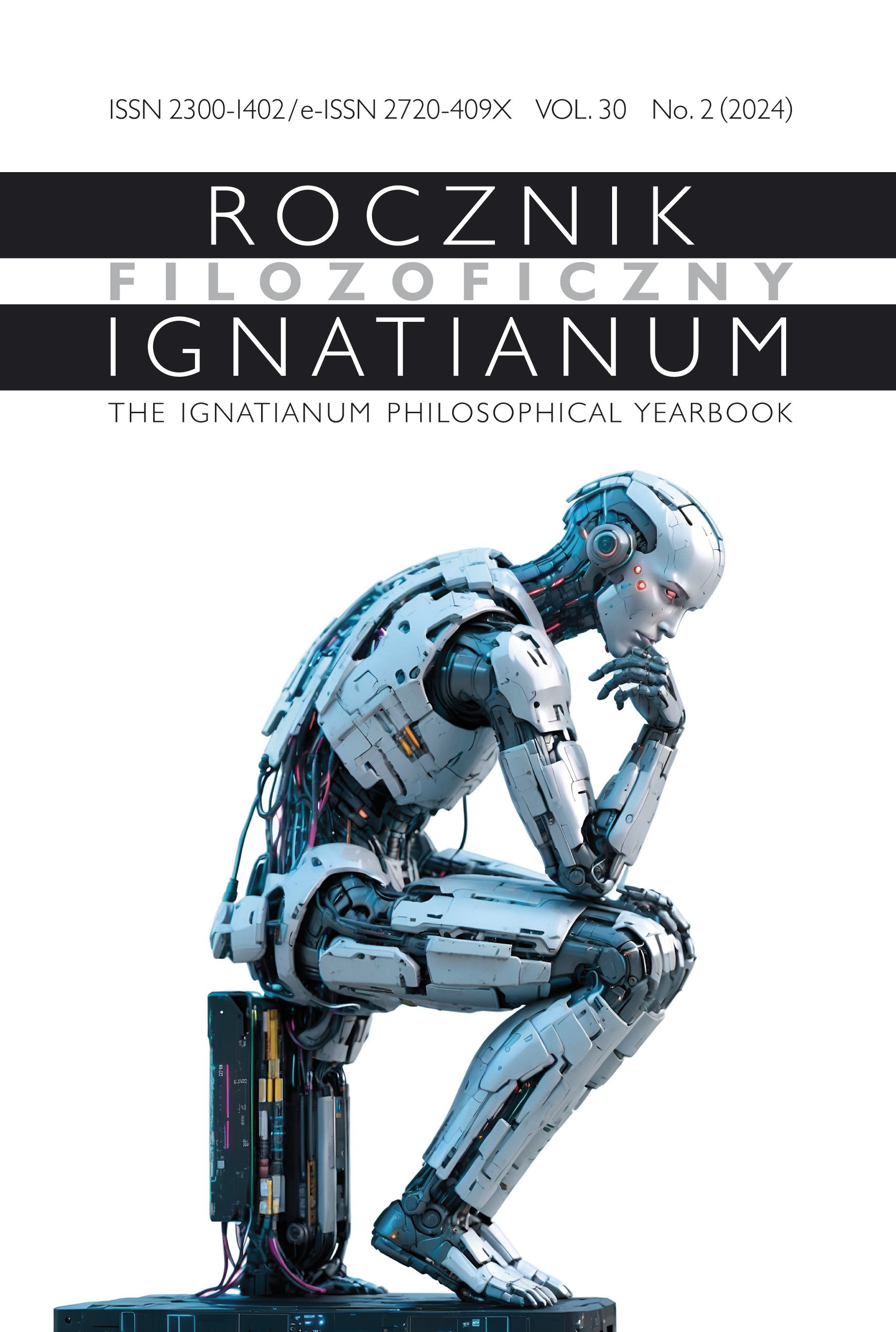Medical Ethics in a Transhumanist Perspective
Abstract
The ethics of transhumanism, i.e. the ethics of human enhancement, is a deontological ethics with the imperative to do good as the basic moral norm. However, the specific practical actions through which a given good is to be realized are assessed in terms of the expected consequences. Thus, transhumanist ethics is essentially consequentialist ethics, and since the transhumanist attitude is expressed in the pursuit of human enhancement, so any “improvement” realized is considered to be an increase in the sum of the good as a result of increased human well-being. Thus, the ethics of human enhancement is a utilitarian ethics. Medical ethics is deontological in nature, but in a transhumanist perspective it becomes a utilitarian ethics – an “improvement” action is judged moral if it increases the sum of the good. This must significantly change the understanding of the basic principles of medical ethics. This change will be a part of a broader and more fundamental change, involving blurring the line between therapeutic and “improving” actions and giving the latter both individual and social dimensions.
References
Beauchamp Tom L., Childress James F., Zasady etyki medycznej, tłum. W. Jacórzyński (Warszawa: Książka i Wiedza, 1996).
DeGrazia David, Millum Joseph, A Theory of Bioethics (Cambridge: Cambridge University Press, 2021).
Gillon Raanan, Etyka lekarska. Problemy filozoficzne, tłum. A. Alichniewicz i A. Szczęsna (Warszawa: Wydawnictwo Lekarskie PZWL, 1997).
Harari Yuval N., Homo deus. Krótka historia jutra, tłum. M. Romanek (Kraków: Wydawnictwo Literackie, 2018).
Harris John, Enhancing Evolution. The Ethical Case for Making Better People (Princeton–Oxford: Princeton University Press, 2007).
Kurzweil Ray, Nadchodzi Osobliwość. Kiedy człowiek przekroczy granice biologii, tłum. E. Chodkowska i A. Nowosielska (Warszawa: Kurhaus, 2013).
Mesko Bertalan, My Health: Upgraded. Revolutionary Technologies to Bring a Healthier Future (Webicina Kft., 2015).
Nowacka Maria, Autonomia pacjenta jako problem moralny (Białystok: Wydawnictwo Uniwersytetu w Białymstoku, 2005).
Rawls John, Teoria sprawiedliwości, tłum. M. Panufnik (Warszawa: PWN, 1994).
Regis Ed, Nanotechnologia, narodziny nowej nauki, czyli świat cząsteczka po cząsteczce, tłum. M. Prywata (Warszawa: Prószyński i S-ka, 2001).
Szewczyk Kazimierz, Etyka i deontologia lekarska (Kraków: PAU, 1994).
Hołub Grzegorz, „W stronę bioetyki personalistycznej”, Seminare. Poszukiwania naukowe 19 (2003): 177–194.
Mullin Amy, „Children, Paternalism and the Development of Autonomy”, Ethical Theory and Moral Practice 17 (3) (2014): 413–426.
Nowacka Maria, „Etyczne podstawy prawa dziecka do otwartej przyszłości”, Studia Redemptorystowskie 16 (2018): 33–53.
Orphanides George, Reinberg Danny, „A Unified Theory of Gene Expression”, Cell 108 (4) (2002): 439–451.
Savulescu Julian, Kahane Guy, „The Moral Obligation to Create Children with the Best Chance of the Best Life”, Bioethics 23 (5) (2009): 274–290.
Szymańska Beata, „Zasada sprawiedliwości a dostęp do opieki zdrowotnej”, Prawo i Społeczeństwo 12 (1) (2012): 159–178.
Bostrom Nick, „Why I Want to Be a Posthuman When I Grow Up”, w: Medical Enhancement and Posthumanity, red. Bert Gordijn, Ruth Chadwick, (Dordrecht: Springer, 2008), 107–137.
Feinberg Joel, „The Child’s Right to an Open Future”, w: Joel Feinberg, Freedom and Fulfilment. Philosophical Essays (Princeton: Princeton University Press, 1992), 76–97.
Kopania Jerzy, „Kartezjanizm transhumanistyczny”, w: Ulepszanie poznawcze człowieka. Perspektywa filozoficzna, red. Piotr Duchliński, Grzegorz Hołub (Kraków: Wydawnictwo Naukowe Akademii Ignatianum, 2021), 185–218.
Kopania Jerzy, „Transhumanizm jako magia racjonalna”, w: Bezpieczeństwo personalne a bezpieczeństwo strukturalne, t. XI: Instrumentarium wojny kulturowej, red. Teresa Grabińska, Piotr Szczepański (Wrocław: Wydawnictwo Akademii Wojsk Lądowych, 2021), 139–167.
Kopania Jerzy, Nowacka Maria, „Od unieśmiertelniania człowieka do śmierci cywilizacji”, w: Ulepszanie człowieka. Perspektywa filozoficzna, red. Piotr Duchliński, Grzegorz Hołub (Kraków: Wydawnictwo Naukowe Akademii Ignatianum, 2018), 31–70.
Nowacka Maria, „Transhumanistyczny sens prawa dziecka do otwartej przyszłości”, w: Ulepszanie moralne człowieka. Perspektywa filozoficzna, red. Piotr Duchliński, Grzegorz Hołub (Kraków: Wydawnictwo Naukowe Akademii Ignatianum, 2019), 93–119.
Sinsheimer Robert L., „The Prospect of Designed Genetic Change”, w: Ethics, Reproduction and Genetic Control, red. Ruth F. Chadwick (London: Routledge, 1992), 136–146.
Mesko Bertalan [interview], A Medical Futurist Discusses Health and Transhumanism, www.psychologytoday.com/us/blog/the-transhumanist-philosop- her/201511/medical-futurist-discusses-health-and-transhumanism (dostęp: 15.03.2022).
Willams John R., Podręcznik etyki lekarskiej, tłum. M. Szewczyński, (World Medical Association, 2005), https://www.wma.net/what-we-do/education/ medical-ethics-manual/ (dostęp: 25.02.2022).
Copyright (c) 2024 Ignatianum University in Cracow

This work is licensed under a Creative Commons Attribution 4.0 International License.
The Yearbook only accepts materials for publication that are free of all conflicts of interest, and that in no way involve conflicts over authorship, copyright, etc. The Editors will take action against any cases of plagiarizing, ghostwriting1, guest/honorary authorship2, etc. Where co-authored work is concerned, the Author listed first is expected to take responsibility for the submission, and is required to make clear the contributions of all of the Co-Authors involved. In the event of the publication owing its existence to funding dedicated to this purpose, this fact should be made clear: e.g. in any note of thanks/acknowledgement, or in a footnote, etc. Explicit notification should be given of any form of reprinting, with the appropriate evidence of permission to publish being furnished as required. Any impropriety on the part of Authors/Reviewers risks exposing them to appropriate responses from the relevant institutions.
______
1 This term refers to instances of a person who has made an essential contribution being omitted from the list of authors, or from notes conveying gratitude and/or acknowledgement.
2 This occurs when a person who has made either an insignificant contribution or no contribution at all nevertheless appears on the list of authors.





